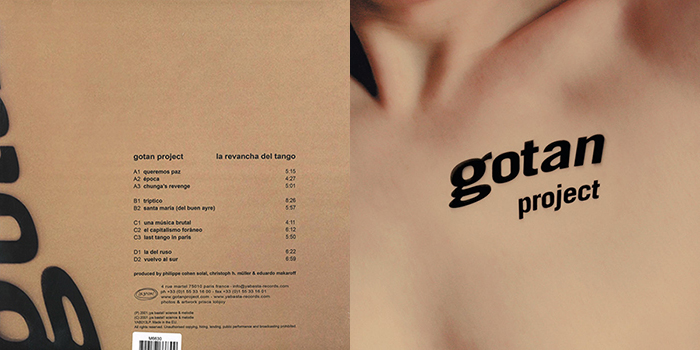Gotan Project – (2001) La Revancha Del Tango
| listen to this album |
Tango cries out for reinvention. The death of Astor Piazzolla in 1992 marked the end of the last great era of experimentation. In Buenos Aires, new revivals and occasional new approaches continue to emerge, but a creative void remains in the genre.
"La Revancha del Tango" by the French-Argentine group Gotan Project takes tango away from the ballroom, the floor show, and the heavy nostalgia that lingers in every step of the dance. Acoustic guitar, piano, double bass, and bandoneón (the plaintive button accordion vital to tango) are layered with dub edits, screeching violins, fast, trance-like beats, and speech samples. They're clearly on a mission to bring tango to the clubland.
Their use of tango stems from the classic, thumping, dance-friendly orchestral sound of the 1930s and 1940s. The repetitions, sudden shifts in direction, and melodramatic excesses fit neatly into the frenetic pace of today's dance beat. But this is music for the lounge, not the salon. Most tracks open with a promising ferocity, but this can quickly descend into a flat, blasé series of variations. And some will find it soporific. The liveliest track on the album, "Last Tango in Paris," is the least grounded tango. In the energetic chacarera "La del ruso," the ten musicians are at their most vibrant when performing jazz-style improvisations.
Their songs feature smoky (though not always atmospheric) female vocals on "Una musica brutal" and the grand Piazzolla-Solanas song "Vuelvo al sur." Some of the vocals recall the bygone glory of the tango canción, but they are essentially decorative, evoking more than they deliver.
That, I suspect, is the project Gotan embarked on to explore and exploit the evocative qualities of the tango, its melancholic moods and romance, and its local mythologies. Their music evokes the shadowy cobblestone backstreets of Buenos Aires, the elegant couples dancing as democracies are overthrown, and the memory of the tango as its only major export. Like a soundtrack, you keep wondering what the film might have been like.
Anyone looking for a new tango maestro will have to wait a little longer. This album is daring on its own terms, and painfully stylish, but it won't lead tango conservatives to threaten the lives of Gotan's musicians as they did with Piazzolla.
This is a trippy, slyly executed, and utterly modern tango sound, but a little too innocent and noncommittal. Where the band will go next with tango, or dance, or jazz, is an open question, but they'll likely go somewhere interesting.


